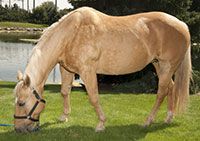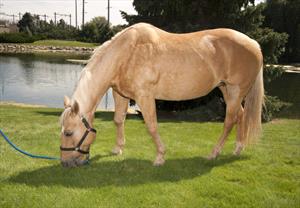

Photo by R. Anson Eaglin, USDA APHIS
Kentucky, home of Lexington, "Horse Capital of the World," recently redefined horses as livestock. Their previous legal designation was domestic companion animal, like dogs and cats.
The reclassification of horses as livestock in Kentucky better positions owners to receive tax breaks on feed and other necessities, and it will not weaken protection rules and reopen slaughter facilities, according to supporters of a new state law.
An amendment to Kentucky Revised Statutes now recognizes equines as livestock rather than domestic companion animals. The unanimous passage of Senate Bill 139, signed by Gov. Matt Bevin on March 27, put horses in the same category as cattle, sheep, swine, goats, alpacas, llamas, buffaloes and related species.
While many in the veterinary profession applaud the change, some activists interpreted it as a reduction in the status of horses intended to help lift the ban on federal funding for horse-slaughter inspection. Without inspections, commercial slaughterhouses cannot ship horse meat interstate and export it overseas. The last horse slaughterhouse in the United States shuttered in 2007.
Critics aired their objections to SB 139 on the Legislature's website and on Facebook. "Get ready for a fight, folks! ... They're smacking their lips to be [sic] horse slaughter back to the USA," an anti-slaughter group warned at the time. One animal rights activist called the bill's supporters "sadistic," while another asserted that state politicians "have taken total lack of care concerning Kentucky's horses to a baser level."
Supporters, however, characterize the controversy as much ado about a very preliminary step toward achieving sales tax equity for horse owners. Dr. Stuart Brown, an equine practitioner and past president of the Kentucky Veterinary Medical Association, explained that the change is part of a long-term plan to "get horse producers treated the same as other livestock producers in regard to the 6 percent sales tax."
In support of the food animal industry, Kentucky tax law exempts from state sales tax purchases of feed, bedding and equipment used to raise and care for livestock. While including equines in the state's livestock definition does not directly address the sales-tax issue, proponents of the move say it makes a stronger case for extending the break to horse owners. Doing so would benefit "many family farm owners in the middle-income market that run boarding operations," Brown said. The governor plans to hold a special legislative session later this year to address comprehensive tax reform, during which the livestock designation could matter for horse owners.
The present tax discrepancy encourages horse producers to misreport that they're buying feed and other supplies for cattle, which could have lethal consequences for horses, Brown said.
"As a veterinarian, what I’ve been fearful of is [seeing] producers get into dire straits," he said. "... I worry about someone getting confused about feed mill orders because someone is trying to save 6 percent sales tax. I worry about them getting monensin in [horse] feed." Monensin is a growth-promoting chemical used for cattle that is toxic to horses.
He added: "If we are going to level the playing field for people who raise and care for horses, we need to get all the regulations consistent and have horses listed with other livestock in the state. That was the intent, so we can advocate for equine producers."
In addition to the livestock change, the governor signed another bill on March 27 that makes it easier for officials to intervene and remove horses in abuse or neglect cases.